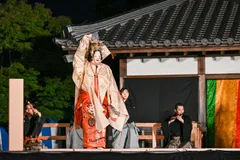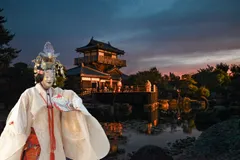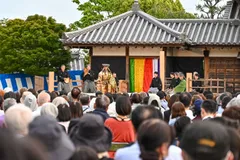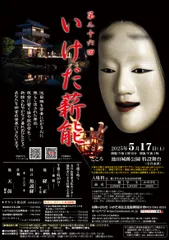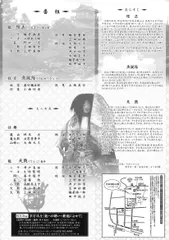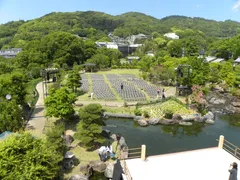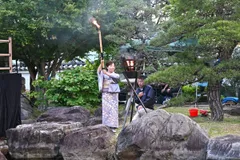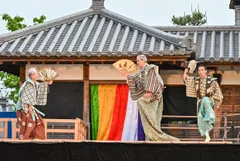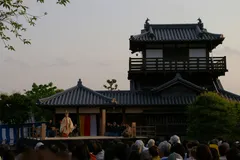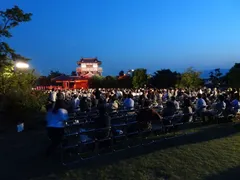<The world's oldest musicals, Noh and Kyogen, will be performed in Osaka! Ikeda Takigi Noh" will be held on May 17 at Ikeda Castle Ruins Park.
The "Ikeda Takigi Noh Play" is about a week away from its opening, Please visit Ikeda City when you come to Expo '70 Osaka/Kansai!
いけだ市民文化振興財団
The Ikeda Citizens Cultural Foundation will hold the 26th Ikeda Takigi Noh (Noh and Kyogen) Performance on Saturday, May 17, 2025 at Ikeda Castle Ruins Park on a special stage. There is only about a week left until the event.
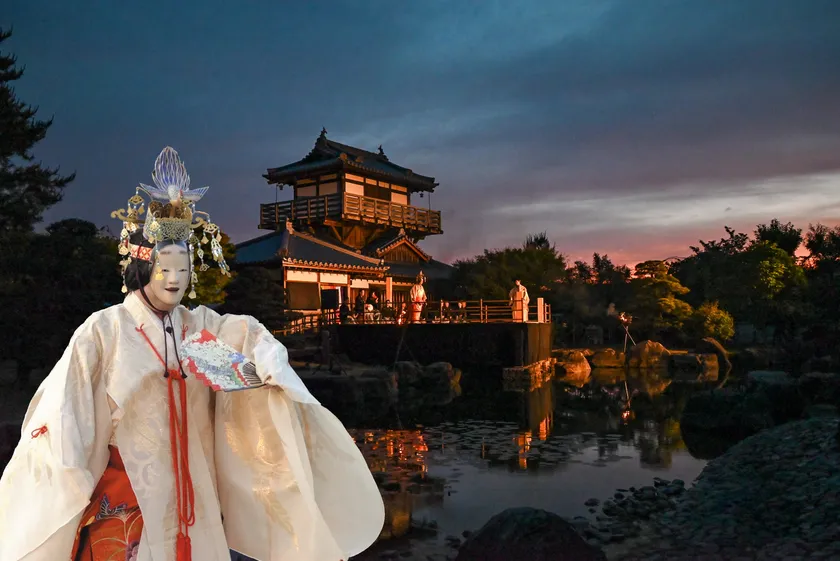
Image of Ikeda Firelit Noh Play
Details: https://azaleanet.or.jp/26th-ikeda-takiginoh/
Name of the event: The 26th Ikeda Takigi Noh Play
The stage lit by a bonfire with Ikeda Castle in the background, the sounds of chants and drums echoing in the night sky....
The stage is lit by a bonfire against the backdrop of Ikeda Castle, and the sounds of chanting and drumming echo in the night sky.
This year's Noh program will feature the popular piece "Kyosho," which tells the story of the unlucky death of the famous biwa player Taira no Tsunemasa, who loved and played the famous instrument "Aoyama" and lived a life of grace and elegance, but was killed in the Battle of Ichinotani, and "Tenko," a story about a child born to a couple in the Later Han Dynasty in China, who grew up with a drum that fell from the sky and died an untimely death, but was given a mysterious event because of his father's love. However, a mysterious event occurs due to the depth of the father's love for the child. The grand story of "Tenko," a beautiful and highly artistic piece, will be performed.
The performance will also include the kyogen "Uo sermon sutra," which depicts the comical situation in which a niwaka monk, a former fisherman, is asked to preach a sutra and tries to get through it with a sutra listing the names of fish, as well as a shimai dance performance.
Date and Time
May 17, 2025 (Sat) Doors open 16:30 Concert begins 17:00
(From 17:00 to 17:30, the program will be performed by the Noh class of the Gogetsuyama Children's Cultural Center.)
Venue
Ikeda Castle Ruins Park Special Stage (3-46 Shiroyamacho, Ikeda City, Osaka Prefecture)
(In case of rain, the venue will be moved to Ikeda Shimin Bunka Kaikan and the doors open at 17:30 and the program begins at 18:00.)
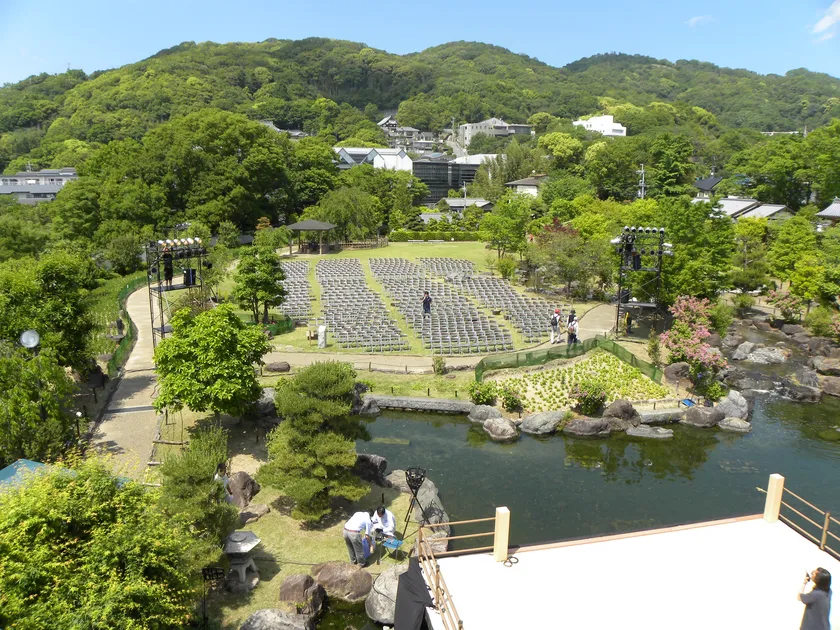
Photo of venue setup
Admission
Adults 3,000 yen/Students 1,000 yen/Elementary and junior high school students 500 yen
Admission for preschool children is not permitted.
Program and Performances
Noh "Tsune Masa" (Noh play) Umewaka Naoyoshi, Kinjiro Ezaki, and others
Kyogen "Uozekyo Sutra" Yagoro Zenchiku, Reo Konishi, et al.
Noh "Tenko" Ryosuke Ido, Ken Otsubo, et al.
Tickets available at
Ikeda Civic Cultural Hall / Ikeda Citizens Cultural Promotion Foundation
Ikeda Castle Ruins Park / Lawson Ticket (L code: 54963), etc.
Tickets on sale from March 1 (Sat.)
Tickets are also available at playguides in Minoh City.
For details, please visit the website.
Website address
https://azaleanet.or.jp/26th-ikeda-takiginoh/
Organizer/Inquiries
Ikeda Civic Cultural Promotion Foundation
TEL: 072-761-3131 (in Ikeda Civic Cultural Hall)
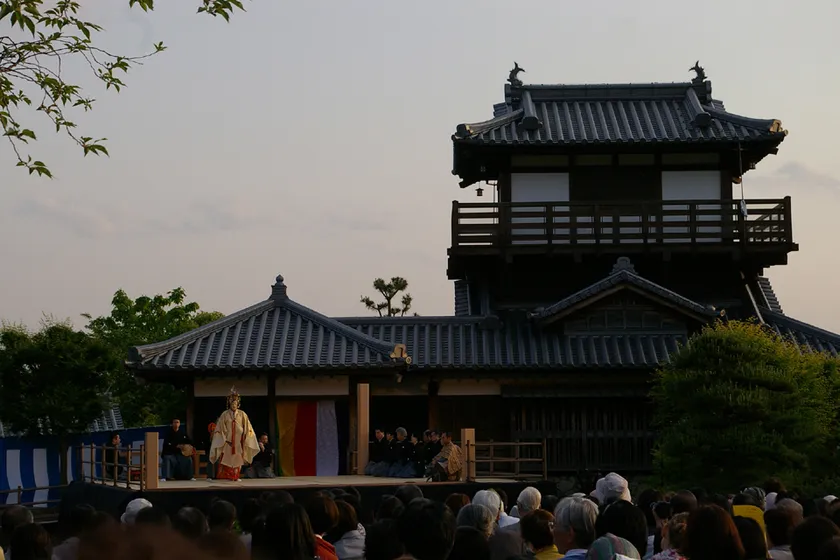
Ikeda Takigi Noh Play from the front
Synopsis of the program
Noh◇ Noh
Kyomu no Tsunemasa
Gyokei, a priest in charge of the Omuro Palace of Ninna-ji Temple in Kyoto, is ordered by Hoshinoh to mourn the death of Taira no Tsunemasa, who was killed in the Battle of Ichinotani (Ichinotani Valley). A biwa (lute) named Seizan, which was the favorite instrument of the famous biwa master, is placed before the Buddha and a kangenkyo* is held.
The music for the repose of the soul of Kyosei's soul echoes through the hall, and after midnight, a shadowy figure is faintly seen in the light of the torch. When Gyokyoei wondered who it was, the figure told him that it was the ghost of Kyosei, and that it had appeared out of gratitude for his condolences.
When Gyoki turned toward the voice, the shadow disappeared like a shimmering flame and only the voice remained. As Gyokiyo exchanges a few words with the voice, the ghost reminisces about the days when he loved flowers, birds, wind, and the moon, and was familiar with poetry, song, and orchestral music. They played Aoyama's biwa and danced, revealing the past and enjoying the evening's entertainment. But it was short-lived. But it was short-lived, for he fell into the path of Shura, and his heart was filled with resentment. Ashamed of his shame, he extinguished the light to avoid being seen, and disappeared in the darkness.
Kangenkou: A memorial service for the dead in which music is played on wind and string instruments.
<Minor highlights
The hero of this piece, Taira no Tsunemasa, was the eldest son of Taira no Tsunemori and a nephew of Taira no Kiyomori, the leader of the Heike clan. He is also the elder brother of Taira Atsumori, the hero of the Noh play "Atsumori". He is said to have been a nobleman with outstanding talent among the Heike clan, who indulged in aristocratic pursuits, and was especially renowned as a master of the biwa (Japanese lute).
With such a background, this piece is a Shura Monogatari, but it has almost no heroic atmosphere. The graceful depiction of the noble figure of Sutemasa reminiscing about his days of poetry and orchestral music creates a graceful atmosphere of dynastic and aristocratic culture that flows throughout the piece. The final scene reveals a bit of Shura, but Kyomasa is so embarrassed to be seen fighting that he even tries to put out the light. This is a well-polished little piece that emphasizes the elegance and grace of the youthful nobleman. The kusei section, in which the singer expresses his nostalgia for the old days and enjoys the sound of his biwa, is particularly interesting, with its richly varied chants and dances.
The light, short, and refreshing atmosphere of the piece has made it popular among young Noh performers, and it is also popular as a Noh play for amateurs to perform as their first shite. In some schools, it is performed with a koshoki (small writing) to add a more elegant atmosphere.
Tenko
During the Later Han Dynasty in China, a couple named Wang Bo and Wang Mi had a child named Tenko, who had a mysterious origin. The child was given to Mother Wang after she had a dream that a drum fell from the heavens and dwelled in her womb. Then, indeed, a drum with a strange tone fell from the heavens. The heavenly drum grew up together with this drum. The sound of the drum was so wonderful that it moved people and brought them joy. Rumors of its existence reached the ears of the emperor, and he issued an imperial decree to summon the drum. However, the drummer refused to comply, and went into hiding with the drum. However, he was caught and drowned in Lu water. The drum was brought to the palace, where various musicians tried to beat it, but it made no sound at all, perhaps because it had lost its master, the heavenly drum. The emperor sent an imperial envoy to summon Wang Bo, the father of the heavenly drum, to play the drum. Wang Bo went up to the palace, prepared to be killed himself if the drum did not sound, and struck it with his heart for his son. The sound was out of this world.
The emperor was so moved that he decided to send Wang Bo home with a reward and hold a concert by Lu Sui to pray for the repose of the soul of Tian Guo. On the day of the lecture, when the emperor went to Lu Sui, the spirit of the heavenly drum appeared and played the nostalgic drum and danced a joyful dance to the accompaniment of the strings. The joyful dancing of the heavenly drum disappeared, as if it were a dream or a reality, when dawn broke and the sky became white.
<Highlights
The first half of the film focuses on the love and grief of Wang Bo over the tragic separation from his son, Tian Gu, while the second half of the film turns around and focuses on the free and vigorous spirit of the mysterious Tian Gu, who plays with his art. The contrast between the two is striking, as the Shite changes from an old man to a child, and the mysterious drum, which is another heavenly drum, is also involved, resulting in a highly artistic and fascinating story.
The "heavenly drum" is also another name for the Tanabata star, and considering the mysteriousness of its birth, the heavenly drum may be an incarnation of a heavenly being. The ghosts that appear in Rozui are depicted as spirits far removed from earthly passions such as grudges and ingratitude.
Kyogen
Uozekyo Sutra
A fisherman who has become tired of killing and has been ordained, but cannot yet read or preach sutra, goes on a tour of the western provinces and heads for the capital to both see the sights and learn about Buddhism. There, he meets a deeply religious man who has come to seek a monk to take care of his Buddhist temple and perform Buddhist rites.
They reach an agreement, and the man takes the priest home and immediately asks him to preach sutra. The monk, embarrassed, tries to get out of the situation by mentioning the names of abundant fish....
- Category:
- Events
